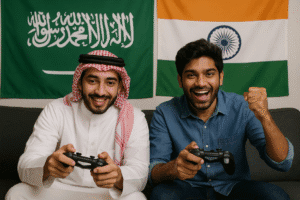Esports Revolution: 7 Powerful Reasons Saudi Arabia and India Are Dominating Global Gaming Together
United by a shared vision to harness gaming’s economic and cultural potential, Saudi Arabia and India are pioneering a transformative partnership in esports. Anchored by Saudi’s Vision 2030 and India’s digital growth ambitions, the collaboration leverages Saudi investments in infrastructure—like the record-breaking Esports World Cup—and India’s vast tech talent pool. With goals to generate $13 billion for Saudi GDP and empower India’s 500 million+ youth gamers, the alliance prioritizes inclusivity, innovation, and cross-border ecosystems.
Initiatives such as talent exchanges, joint tournaments, and policy frameworks aim to bridge cultures and fuel a $600 billion global industry. Saudi’s focus on gender parity (women forming 50% of its gaming community) and India’s indie developer boom highlight grassroots impact. Challenges like regulatory alignment and equitable growth remain, yet their synergy offers a blueprint for emerging economies to turn gaming into a vehicle for job creation, soft power, and global connection. This partnership isn’t just about games—it’s about rewriting the rules of international collaboration in the digital age.

Esports Revolution: 7 Powerful Reasons Saudi Arabia and India Are Dominating Global Gaming Together
As the digital entertainment landscape evolves, Saudi Arabia and India are emerging as unexpected yet strategic allies in shaping the future of esports and gaming. Their collaboration, spotlighted at events like the WAVES Summit in Mumbai and Saudi Arabia’s Esports World Cup, signals a transformative shift in how nations can leverage technology, culture, and economic vision to drive innovation.
A Shared Vision for Economic and Cultural Transformation
Both nations recognize gaming as more than entertainment—it’s a catalyst for youth engagement, job creation, and technological advancement. Saudi Arabia’s Vision 2030, spearheaded by Crown Prince Mohammed bin Salman, positions gaming and esports as cornerstones of economic diversification, aiming to contribute $13 billion to GDP and create 39,000 jobs by 2030. India, under Prime Minister Narendra Modi, mirrors this ambition, harnessing its tech talent pool and digital infrastructure to become a global gaming powerhouse.
The synergy lies in their complementary strengths: Saudi Arabia offers robust investment capabilities and strategic initiatives like the Esports World Cup—a 2023 debut that drew 500 million viewers—while India brings a vast developer community and one of the world’s largest youth populations. Together, they can redefine the Global South’s role in a $600 billion global gaming industry projected by 2030.
Building Ecosystems: Beyond Infrastructure
Saudi Arabia’s unified national strategy—integrating government, private sector, and federations like the Saudi Esports Federation (SEF)—provides a blueprint for India. The SEF’s focus on inclusivity, with women now comprising nearly half of Saudi gamers, underscores the societal impact of gaming. India, with its thriving indie game studios and rising esports leagues, could adopt similar frameworks to empower underrepresented groups and foster grassroots talent.
Collaborative opportunities abound:
- Talent Exchange: Indian developers could tap Saudi-funded incubators, while Saudi esports athletes compete in India’s growing tournament circuits.
- Infrastructure Sharing: Saudi’s state-of-the-art venues, like those used for the Esports World Cup, could host Indo-Arab gaming festivals, blending cultural narratives with competitive play.
- Policy Innovation: Joint initiatives in regulation, content localization, and anti-piracy measures could set regional standards.
Cultural Bridges and Soft Power
Gaming’s universal appeal makes it a unique soft power tool. Saudi Arabia’s gaming festivals and India’s rich storytelling traditions offer avenues to co-create content resonating across borders. Imagine games featuring Rajasthani folklore developed in Riyadh’s tech hubs or collaborative esports leagues showcasing regional diversity.
Moreover, Saudi initiatives like the New Global Sport Conference (NGSC) and India’s WAVES Summit provide platforms for cross-border dialogue, addressing challenges like digital inclusion and ethical AI use in gaming.
Challenges and the Road Ahead
While optimism abounds, hurdles remain. Bridging cultural nuances, aligning regulatory frameworks, and ensuring equitable benefits for both ecosystems will require sustained dialogue. Investments must prioritize not just elite tournaments but also community-driven projects, such as gaming academies in rural India or Saudi-funded scholarships for Indian developers.
Conclusion: A Playbook for Global Collaboration
The Saudi-India partnership exemplifies how nations can transcend traditional diplomacy through shared digital ambitions. By blending Saudi Arabia’s strategic investments with India’s innovation ecosystem, they offer a model for emerging economies to harness gaming’s potential. As Faisal bin Bandar Al Saud, Chairman of SEF, aptly notes, the future belongs to those who invest in “technology, creativity, and talent.”
For stakeholders, the call is clear: Collaborate to cultivate inclusive growth, celebrate cultural diversity, and position esports as a force for global connection. The game is on—and the world is watching.
You must be logged in to post a comment.